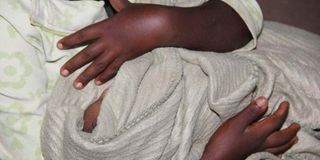Cry our beloved children: They are girls, not mothers

Teen mother. She is also a victim of incest.
What you need to know:
- Defilement is not a topic this publication will stop speaking about soon.
- Each year, during the 16-day campaign to end violence against women and girls, we double our efforts to amplify our voices and raise awareness to eliminate the violence.
Hundreds of Kenyan girls under age 14 are impregnated, each year, often as a result of defilement. Defilement is not a topic this publication will stop speaking about soon. That is why each year, during the 16-day campaign to end violence against women and girls, we double our efforts to amplify our voices and raise awareness to eliminate the violence.
My hope is that the regular coverage throws light on the extent and depth of the problem, and makes it a national conversation. What we cover is a fraction of cases that happen in real life. As I write this, a child is probably being violated somewhere. Indeed, sexual violence against girls is on the rise.
Every year, half of the world’s children experience some form of violence, with data indicating that 50 per cent of sexual assaults are committed against girls below the age of 16.
Statistically, Vivian*, a girl we feature in our cover story today, is the one in four girls sexually abused before they turn 18. Innocent and vulnerable, children like her are violated by neighbours, relatives, teachers, and, sometimes, strangers who take undue advantage of them. Sadly, the abuse that has shaped Vivian’s life could have been prevented, but cultural forces and norms didn’t allow for that.
Defilement and incest are grossly underreported and shrouded in silence. A silence perpetuated by the legal system and a retrogressive culture. Silence is the powerful weapon perpetrators use to threaten their victims.
The legal system remains porous, offering loopholes for incest and defilement, essentially rewarding abusers. It allows for such heinous crimes to last for years, with the conviction rate remaining low. Most of these cases are settled by compromise between the victim’s and the perpetrator’s family, unfortunately.
I am a proponent of sex education in schools. This would ensure children and adolescents have the skills to sound an alarm if they are threatened by sexual violence.
Children need to be loved, guided and protected. Today’s parents, guardians and caregivers, charged with the responsibility of protecting them, hardly spend quality time with the children, exposing them to harmful experiences.
Girls deserve a life free from violence and disease; a childhood without the responsibility of being called mother. They must be protected from the triple threat, a theme that featured prominently in the inaugural Sigand Nyinam Convention held in Homa Bay County earlier in the week.
The meticulous event brought together Luo Nyanza women from various sectors, including politics, to assess their status – their past, present and future. Sadly, the region is among those leading with new HIV cases, teenage pregnancies and gender-based violence, a matter that influenced the organisers’ choice of this year’s theme.
The rallying call was unity to combat the three vices, with the women, led by Ms Ida Odinga and Homa Bay Governor Gladys Wanga, remaining optimistic about change.
When women come together and support each other, magic happens. Sigand Nyinam (Nyanza), Daughters of Mumbi (Mt Kenya) and Mulembe Women Caucus (Western) are among community women’s groups that can create momentum and help foster positive change for the women and girls of Kenya.
Each of us, regardless of the position we hold in society, has a responsibility to make Kenya a better place for women and girls. Our country must be better than this. Not one woman or girl less.





